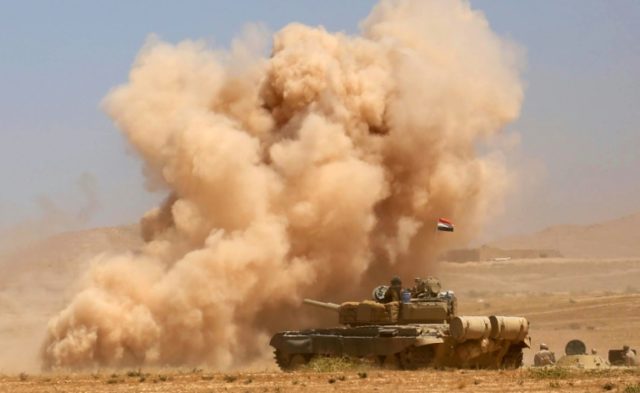The “increasingly deadly” explosives the Islamic State (ISIS/ISIL) left behind across Iraq are preventing residents from returning home and impeding the delivery of vital aid and reconstruction efforts, the United Nations revealed.
“Thousands of explosive devices were prepared in advance to prevent people from returning, and they remain buried in rubble, or hidden in homes,” reports U.N. News.
“The explosives are now buried under tons of rubble, creating a new challenge to the Iraqi government and NGOs in clearing the cities,” adds the Kurdish outlet Bas News.
According to the U.N. Mine Action Service (UNMAS), its teams are working with their allies in the “most complex and challenging environment imaginable” to combat these threats.
The international body notes that the so-called “evil genius” tactics the Islamic State employs have “significantly aggravated the situation,” the U.N. News reports.
Warnings about the live explosives left behind come soon after Iraqi officials and the World Bank estimated the cost of rebuilding Iraq after nearly three years of war against ISIS at more than $88 billion.
“All told, the Iraq government is seeking about $100 billion in foreign investment for its energy, agricultural and transport sectors,” reported the Wall Street Journal (WSJ).
Referring to the more than $88 billion in reconstruction expenses, Reuters learned from Qusay Adulfattah, the director-general of Iraq’s planning ministry, that “about $23 billion will be needed in the short term and more than $65 billion in the medium term.”
Acknowledging that it has already spent billions in Iraq, the United States plans to sign a memorandum of understanding to facilitate project financing estimated between $2 billion and $3 billion, revealed the WSJ.
Since the first war in Iraq started in 2003 in response to 9/11, the United States has spent about $820 billion, including $1 billion allocated for this year, a Brown University analysis reveals.
In December 2017, the Iraqi government declared victory over ISIS. However, U.S. and Iraqi officials warn that the group remains a threat.
In its most recent World Wide Threat Assessment, the U.S. intelligence community warns:
Over the next year, we expect that ISIS is likely to focus on regrouping in Iraq and Syria, enhancing its global presence, championing its cause, planning international attacks, and encouraging its members and sympathizers to attack in their home countries. ISIS’s claim of having a functioning caliphate that governs populations is all but thwarted.
ISIS core has started—and probably will maintain—a robust insurgency in Iraq and Syria as part of a long-term strategy to ultimately enable the reemergence of its so-called caliphate. This activity will challenge local [counterterrorism] efforts against the group and threaten US interests in the region.
The assessment points out that it may be difficult for the U.S.-led coalition against ISIS “to portray the group as defeated,” adding that “the coalition’s will to fight will ultimately weaken.”
In late January, NBC News reported that ISIS counts with at least 3,000 active terrorists and about 7,000 loyalists in Iraq and Syria.

COMMENTS
Please let us know if you're having issues with commenting.